Table of Contents
Yoga and calisthenics are two popular forms of exercise that offer a variety of benefits. Yoga is a mind-body practice that combines physical poses, breathing exercises, and meditation. Calisthenics is a form of bodyweight training that uses exercises like push-ups, pull-ups, and squats to build strength, flexibility, and endurance. Both yoga and calisthenics can be beneficial for people of all ages and fitness levels, but they have different focuses and benefits. In this article, we will compare yoga vs calisthenics and discuss the pros and cons of each to help you decide which one is right for you. Whether you're a beginner or an experienced athlete, Kizworld has the information you need to make the most of your fitness journey.
Yoga vs Calisthenics: The Ultimate Guide to Choosing the Right Fitness Regimen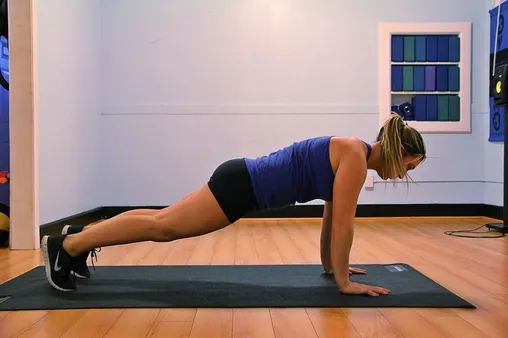
Yoga vs Calisthenics | ||
|---|---|---|
Characteristic | Yoga | Calisthenics |
Type | Mind-Body Practice | Bodyweight Training |
Focus | Flexibility, Balance, Strength | Strength, Power, Endurance |
Difficulty | Beginner-Friendly to Advanced | Intermediate to Advanced |
Equipment | Mat, Blocks (Optional) | Bodyweight Only |
Potential Benefits | Improved Flexibility, Balance, Strength, Stress Reduction | Increased Strength, Power, Endurance, Body Composition |
Potential Risks | Muscle Strains, Injuries (if not done correctly) | Joint Pain, Injuries (if not done correctly) |
Best For | Individuals Seeking Improved Flexibility, Balance, Strength, and Stress Relief | Individuals Seeking Increased Strength, Power, Endurance, and Body Composition |
I. Different Types of Workouts
Yoga
Yoga is a mind-body practice that combines physical poses, breathing exercises, and meditation. It is designed to improve flexibility, balance, strength, and stress relief. Yoga is a low-impact exercise that is suitable for people of all ages and fitness levels.
- How to do a muscle-up
- The best calisthenics videos and tutorials
- The best calisthenics exercises and variations
Calisthenics
Calisthenics is a bodyweight training that uses bodyweight movements to build strength, power, endurance, and coordination. Calisthenics exercises are often performed in a circuit format, which means that you will perform a series of exercises one after the other with little rest in between. Calisthenics is a challenging workout that is suitable for people of all ages and fitness levels.
Equipment | Benefits |
|---|---|
Bodyweight only | Increased strength, power, endurance, and body composition |
- The best calisthenics bars and rings
- The best calisthenics mats and blocks
- The best calisthenics bands and straps
- How to do a calisthenics skin the cat
Different Types of Workouts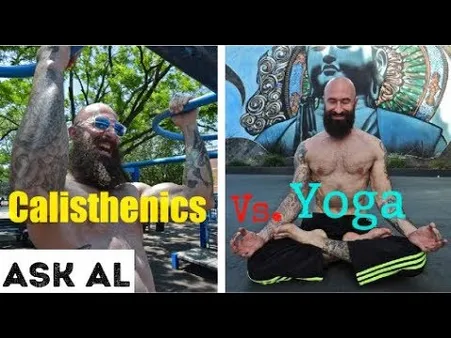
II. Physical Benefits
Improved Flexibility and Mobility
Yoga poses require you to stretch and hold your body in various positions, which can help to improve your flexibility and mobility. This can lead to a number of benefits, including reduced risk of injury, improved posture, and increased range of motion.
Calisthenics exercises also help to improve flexibility and mobility, but they do so in a different way. When you perform calisthenics exercises, you are using your body weight to resist gravity. This helps to strengthen your muscles and connective tissues, which can lead to increased flexibility and mobility.
Type of Exercise | Primary Benefits |
|---|---|
Yoga | Improved flexibility, mobility, and balance |
Calisthenics | Increased strength, power, endurance, and body composition |
Increased Strength and Power
Yoga can help to increase strength and power by building lean muscle mass. When you hold a yoga pose, you are essentially using your muscles to resist gravity. This helps to strengthen your muscles and improve your overall strength and power.
Calisthenics exercises are also very effective for increasing strength and power. Calisthenics exercises use bodyweight as resistance, which means that you can gradually increase the difficulty of your workouts as you get stronger.
Enhanced Endurance
Yoga can help to improve endurance by increasing your cardiovascular fitness. When you practice yoga, you are constantly moving and breathing deeply. This helps to strengthen your heart and lungs, which can lead to improved endurance.
Calisthenics exercises can also help to improve endurance. Calisthenics exercises are typically performed in sets, which means that you are doing multiple repetitions of the same exercise. This can help to improve your muscular endurance, which can lead to improved overall endurance.
What are the best calisthenics exercises for beginners?
Physical Benefits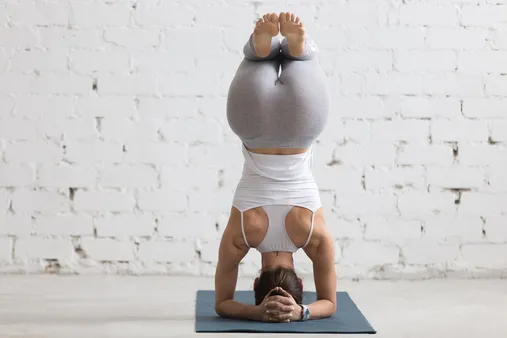
III. Yoga or Calisthenics Which One To Choose
Consider your fitness goals
Yoga and calisthenics are both excellent forms of exercise, but they have different benefits and drawbacks. Yoga is a mind-body practice that focuses on flexibility, balance, and strength. Calisthenics is a bodyweight training method that focuses on strength, power, and endurance.If you're looking to improve your flexibility, balance, and strength, yoga is a great option. Yoga can also help you reduce stress and improve your overall well-being. If you're looking to build strength, power, and endurance, calisthenics is a great option. Calisthenics can also help you improve your body composition and burn fat.Ultimately, the best workout for you is the one that you enjoy and that you will stick with. If you're not sure which workout is right for you, try both yoga and calisthenics and see which one you prefer.Calisthenics Exercises and Variations
Consider your fitness level
Yoga and calisthenics are both challenging workouts, but calisthenics is generally more difficult. If you're a beginner, you may want to start with yoga and then transition to calisthenics once you're more fit.Yoga is a great option for beginners because it is low-impact and easy to learn. Calisthenics can be more challenging for beginners, but it can also be more rewarding. If you're willing to put in the effort, calisthenics can help you achieve amazing results.Yoga Poses for Flexibility
Consider your lifestyle
Yoga and calisthenics are both flexible forms of exercise that can be done at home or at the gym. Yoga is a great option for people who have busy schedules or who don't like to go to the gym. Calisthenics is a great option for people who want to get a full-body workout without using any equipment.Ultimately, the best workout for you is the one that you can fit into your lifestyle. If you're not sure which workout is right for you, try both yoga and calisthenics and see which one you prefer.
Yoga | Calisthenics | |
|---|---|---|
Focus | Flexibility, balance, strength | Strength, power, endurance |
Difficulty | Beginner-friendly to advanced | Intermediate to advanced |
Equipment | Mat, blocks (optional) | Bodyweight only |
Potential benefits | Improved flexibility, balance, strength, stress reduction | Increased strength, power, endurance, body composition |
Potential risks | Muscle strains, injuries (if not done correctly) | Joint pain, injuries (if not done correctly) |
Yoga or Calisthenics Which One To Choose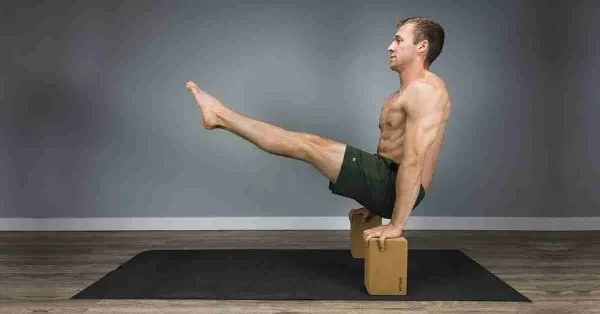
IV. Suitable Backgrounds
Yoga and calisthenics are both great forms of exercise but may be better suited for different individuals depending on their fitness goals and backgrounds.Yoga is a good choice for beginners who are new to exercise or those who are looking for a low-impact workout. It is also a good option for those who want to improve their flexibility, balance, and strength.Calisthenics, on the other hand, is a more advanced form of exercise and is best suited for those who have some experience with strength training. It is a great way to build strength, power, and endurance.Here is a table summarizing the key differences between yoga and calisthenics:
Characteristic | Yoga | Calisthenics |
|---|---|---|
Type | Mind-Body Practice | Bodyweight Training |
Focus | Flexibility, Balance, Strength | Strength, Power, Endurance |
Difficulty | Beginner-Friendly to Advanced | Intermediate to Advanced |
Equipment | Mat, Blocks (Optional) | Bodyweight Only |
Potential Benefits | Improved Flexibility, Balance, Strength, Stress Reduction | Increased Strength, Power, Endurance, Body Composition |
Potential Risks | Muscle Strains, Injuries (if not done correctly) | Joint Pain, Injuries (if not done correctly) |
Best For | Individuals Seeking Improved Flexibility, Balance, Strength, and Stress Relief | Individuals Seeking Increased Strength, Power, Endurance, and Body Composition |
Ultimately, the best way to decide which form of exercise is right for you is to try both and see which one you enjoy more. If you are new to exercise, it is always a good idea to consult with a qualified personal trainer before starting any new workout program.If you are interested in learning more about yoga, check out our article on how to do yoga. If you are interested in learning more about calisthenics, check out our article on how to do calisthenics.
Suitable Backgrounds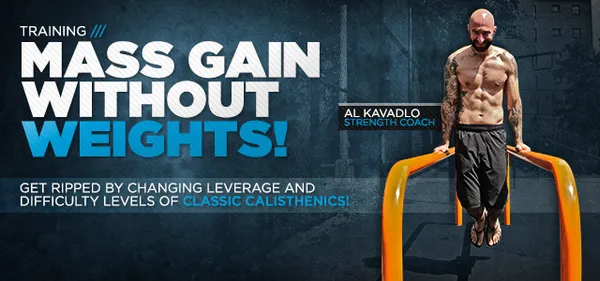
V. Conclusion
Yoga and calisthenics are both excellent forms of exercise with their own unique benefits. Yoga is a mind-body practice that emphasizes flexibility, strength, and balance, while calisthenics is a bodyweight training method that focuses on building strength, power, and endurance. Ultimately, the best choice for you will depend on your individual fitness goals and preferences. If you're looking for a low-impact, holistic practice that can improve your flexibility, balance, and overall well-being, yoga may be a good option for you. If you're looking for a challenging, effective way to build strength, power, and endurance, calisthenics may be a better choice. Whichever you choose, both yoga and calisthenics can be great ways to improve your physical and mental health.